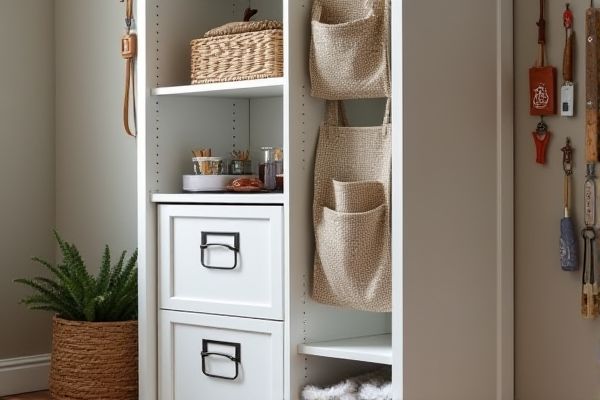
Pocket organizers maximize vertical space and keep small items easily accessible, while cubby bins offer larger compartments ideal for sorting bulkier basement items. Discover which storage solution best suits your basement organization needs by reading the full article.
Table of Comparison
| Feature | Pocket Organizer | Cubby Bins Basement |
|---|---|---|
| Storage Type | Compact pockets for small items | Large open cubbies for bulkier storage |
| Space Efficiency | Maximizes vertical space, ideal for limited areas | Requires more floor space, suitable for spacious basements |
| Accessibility | Easy, quick access to small essentials | Organized storage with visible compartments |
| Use Case | Best for small tools, accessories, and documents | Ideal for sports gear, seasonal items, and larger objects |
| Material | Fabric, plastic or leather variants | Wood, plastic, or metal construction |
| Portability | Lightweight, easy to move | Stationary, designed for fixed basement use |
| Cost | Generally affordable | Varies, typically higher depending on size/material |
Introduction to Basement Storage Solutions
Basement storage solutions like pocket organizers and cubby bins offer efficient ways to declutter and maximize space. Pocket organizers provide compact compartments ideal for small items, while cubby bins accommodate larger, bulkier belongings with easy accessibility. Choosing the right system depends on the types of items stored and the desired organization method.
Understanding Pocket Organizers
Pocket organizers provide a versatile and compact storage solution, ideal for organizing small items in your basement efficiently. Unlike cubby bins, pocket organizers utilize hanging pockets to maximize vertical space, making it easier to categorize tools, craft supplies, or seasonal accessories. Your basement storage improves significantly with pocket organizers due to their accessibility and ability to reduce clutter in confined areas.
What Are Cubby Bins?
Cubby bins are compartmentalized storage units designed to organize various items in a neat and accessible way, often used in basements to maximize space efficiency. These bins provide individual slots ideal for sorting tools, craft supplies, or seasonal decorations, enabling you to maintain a clutter-free environment. Compared to pocket organizers, cubby bins offer larger, sturdier compartments that accommodate bulkier items while promoting easy visibility and retrieval.
Space Efficiency: Pocket Organizers vs Cubby Bins
Pocket organizers maximize vertical space by hanging on walls or doors, making them ideal for small basements with limited floor area. Cubby bins optimize horizontal space with stackable compartments, offering easy access to larger items while using the floor efficiently. Choosing the right option depends on your basement's layout and the types of items you need to store for optimal space efficiency.
Accessibility and Organization Features
Pocket organizers offer individual compartments that make small item access quick and straightforward, ideal for keeping tools or craft supplies neatly separated. Cubby bins provide larger, open storage spaces designed to accommodate bulkier items, making it easy for you to quickly grab boxes or bins stored in your basement. Both systems enhance overall organization but differ in accessibility based on item size and usage frequency.
Material Durability and Maintenance
Pocket organizers, often made from fabric or lightweight plastic, offer moderate durability but require regular cleaning to prevent dust accumulation and stain retention. Cubby bins, typically constructed from sturdy materials such as wood, metal, or heavy-duty plastic, provide enhanced durability suited for basement environments prone to moisture and temperature fluctuations. Choosing the right storage depends on your need for easy maintenance versus long-lasting resilience under harsh basement conditions.
Installation and Setup Comparison
Pocket organizers offer easy installation, often requiring only hooks or adhesive strips for mounting on walls, making them ideal for quick setup in basement spaces. Cubby bins typically involve a more involved assembly process, as they are larger, freestanding units that may require screwing together multiple pieces or anchoring for stability. Your choice depends on how much time and effort you're willing to invest in organizing your basement efficiently.
Cost Analysis: Pocket Organizer vs Cubby Bins
Pocket organizers typically cost less upfront, ranging from $10 to $30 per unit, making them an affordable option for quick basement storage solutions. Cubby bins, especially modular or custom-built versions, can range from $50 to over $200 depending on size and material, presenting a higher initial investment but offering enhanced durability and customizable organization. Your choice depends on balancing budget constraints with the desired storage capacity and long-term use.
Best Uses for Each Storage Option
Pocket organizers excel in storing small, frequently accessed items such as tools, craft supplies, or hardware, making them ideal for keeping essentials visible and organized in a basement workspace. Cubby bins offer superior bulk storage for larger or irregularly shaped items like seasonal decorations, sports equipment, or bulk household goods, maximizing vertical space in basement storage areas. Choosing between these options depends on the need for easy access to small items versus capacity for larger belongings.
Choosing the Right Basement Storage System
Selecting the ideal basement storage system depends on the specific needs for organization and space utilization. Pocket organizers provide compact, easily accessible compartments ideal for small tools and accessories, optimizing vertical space on walls or workbenches. Cubby bins offer larger, versatile storage suitable for bulky items and seasonal gear, making them a practical solution for maximizing floor space while keeping the basement clutter-free.
 homyna.com
homyna.com